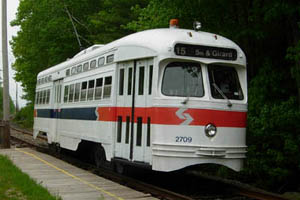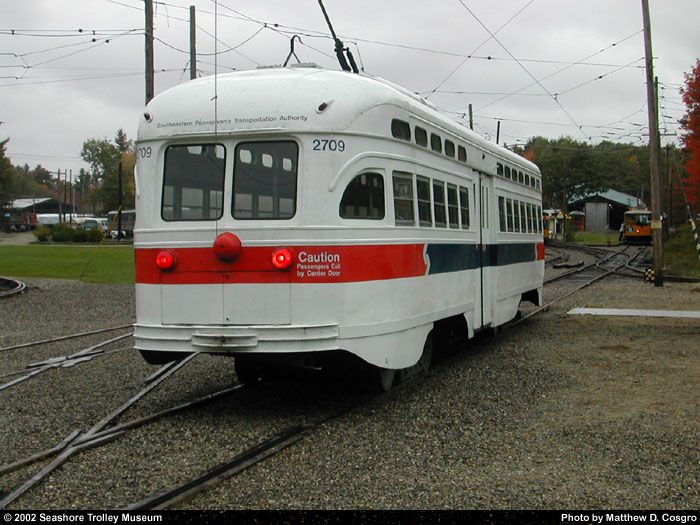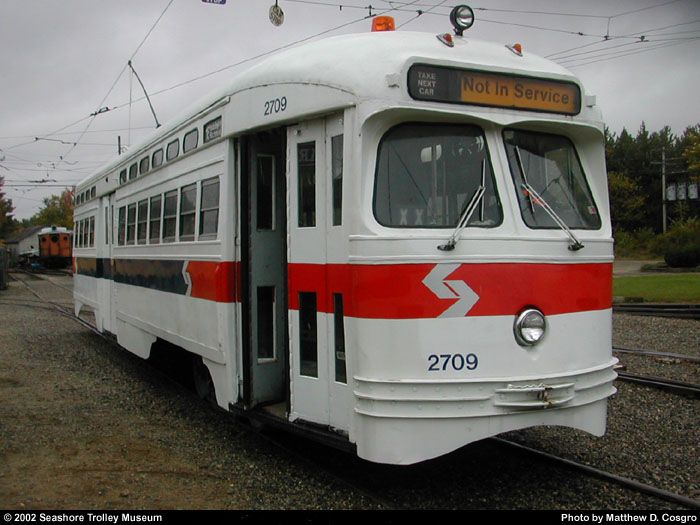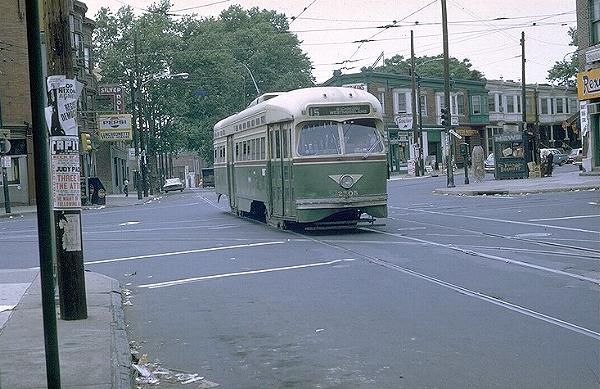
- Builder
- St. Louis Car Co.
- Description
- PCC, Post-war all-electric
- Secondary Use
- None
- Type
- City and Suburban Streetcars
- Year
- 1947
- Retired from Service
- 1995
- Acquired by the Museum
- 1995
- Fund
- 807
SEPTA 2709
From Philadelphia, Pennsylvania
History
The Philadelphia Transportation Co. owned nearly 600 PCC cars. The PCC car takes its name from the Electric Railway Presidents Conference established in the early 1930s to design a modern, streamlined streetcar. It was a successful design with approximately 5000 PCC cars being built between 1936 and 1952 for systems in the U.S. and Canada. PCC cars built after World War II used the all-electric variation having electric brakes instead of the earlier air-operated brakes. No. 2709 is one of 200 all-electric PCCs built by St. Louis Car for PTC in 1947 to replace older, standard streetcars. This group of PCCs is one of approximately 1500 similar streetcars built by St. Louis Car from 1947 to 1952 and sold to various streetcar operators. Another 500 relatively similar PCC cars were produced by Pullman-Standard for several systems, including Massachusetts Bay Transportation Authority No. 3221 which is also at Seashore. However, No. 2709 is an unusual PCC car because it was built for two-man operation. Traffic density on several Philadelphia lines operated with PCCs was so heavy that two-man crews were needed during rush hours, and one line required such operation all day. Thus, the final order for new PCC cars placed by the Philadelphia Transportation Co. was split three ways. There were 90 cars without conductor’s stands (2096-2185), 30 cars without motorman’s fare box brackets (2701-2730), and 80 cars with both (2731-2810). The 30 cars equipped for two-man operation only were used for base service on Route 23, the system’s longest and busiest line stretching from Germantown in the city’s far northwest, through North Philadelphia and Center City almost to the Navy Yard in the south. No portion of the line had light traffic, and transfers were available to almost every other streetcar or bus line in the city, as well as the Broad Street Subway. With this level of service, the company had no qualms about a 30 car fleet of its most modern cars being dedicated to the line.
As traffic declined, the PTC eventually converted these cars for one-man operation, and they soldiered on into the 1990s, serving other lines as the demands of Route 23 dropped. In 1968, the Southeast Pennsylvania Transportation Authority (a state agency) acquired the PTC. SEPTA repainted the streetcars from PTC’s green and cream colors to SEPTA’s white with a blue and red stripe. No. 2709 went through a major overhaul in the 1980s. The inability of SEPTA to purchase replacement cars, finally turned Route 23 and its east-west neighbor, Route 56 into permanent bus lines, and SEPTA retired its PCC cars. In 2002-4, SEPTA rebuilt 18 of its stored PCC cars for operation on Route 15 (Girard Ave.).
Seashore purchased No. 2709 from SEPTA in 1994. The car was in excellent, operating condition. Like a few other cities, Philadelphia used a streetcar track gauge that was wider than the standard 4’ 8 ½.” Philadelphia’s gauge was 5’ 2 ¼.” To convert No. 2709 to the museum’s standard gauge, Seashore replaced the wheels and axles with components from a Boston streetcar. In 2009, Seashore replaced one motor on No. 2709. At the time, the car was suffering from rust and various other defects.
Technical Information
- Seats: 47
- Control: Westinghouse PCC
- Brakes: Dynamic / Electric Drum / Track
- Compressor: None
Trucks
- Number: 2
- Manufacturer: Clark
- Model: B-2
Motor
- Number: 4
- Manufacturer: Westinghouse
- Model: 1432J
Weight and Dimensions
- Length: 46’ 8.00"
- Width: 8’ 5.00"
- Height: 11’ 3.00"
- Weight: 39600 lbs.
Additional Images

Matthew D. Cosgro in 2002

Matthew D. Cosgro in 2002

Sister car 2705 in Philadelphia 06/01/69 – newdavesrailpix.com
© 1998 - 2025 New England Electric Railway Historical Society. All Rights Reserved.